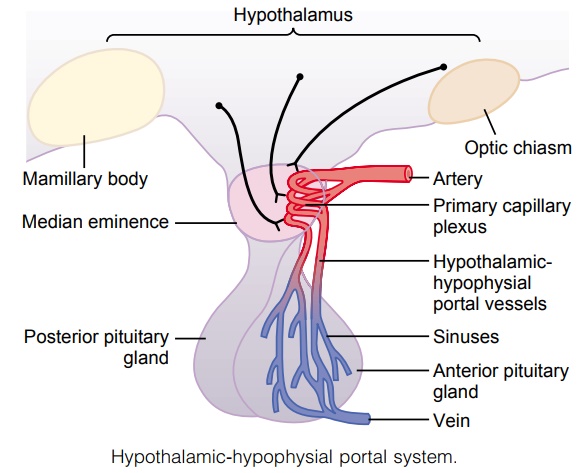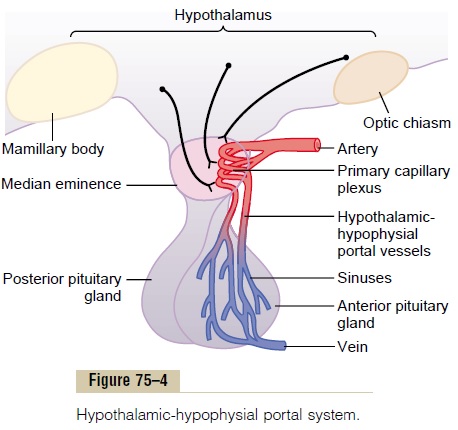Chapter: Medical Physiology: Pituitary Hormones and Their Control by the Hypothalamus
Hypothalamus Controls Pituitary Secretion

Hypothalamus Controls Pituitary Secretion
Almost all secretion by the pituitary is controlled by either hormonal or nervous signals from the hypo-thalamus. Indeed, when the pituitary gland is removed from its normal position beneath the hypothalamus and transplanted to some other part of the body, its rates of secretion of the different hormones (except for prolactin) fall to very low levels.
Secretion from the posterior pituitary is controlled by nerve signals that originate in the hypothalamus and terminate in the posterior pituitary. In contrast, secretion by the anterior pituitary is controlled by hor-mones called hypothalamic releasing and hypothala-mic inhibitory hormones (or factors) secreted withinthe hypothalamus itself and then conducted, as shown in Figure 75–4, to the anterior pituitary through minute blood vessels called hypothalamic-hypophysialportal vessels. In the anterior pituitary, these releasingand inhibitory hormones act on the glandular cells to control their secretion. This system of control is discussed in the next section.

The hypothalamus receives signals from many sources in the nervous system. Thus, when a person is exposed to pain, a portion of the pain signal is trans-mitted into the hypothalamus. Likewise, when a person experiences some powerful depressing or excit-ing thought, a portion of the signal is transmitted into the hypothalamus. Olfactory stimuli denoting pleasant or unpleasant smells transmit strong signal compo-nents directly and through the amygdaloid nuclei into the hypothalamus. Even the concentrations of nutri-ents, electrolytes, water, and various hormones in the blood excite or inhibit various portions of the hypo-thalamus. Thus, the hypothalamus is a collecting center for information concerning the internal well-being of the body, and much of this information is used to control secretions of the many globally important pituitary hormones.
Hypothalamic-Hypophysial Portal Blood Vessels of the Anterior Pituitary Gland
The anterior pituitary is a highly vascular gland with extensive capillary sinuses among the glandular cells. Almost all the blood that enters these sinuses passes first through another capillary bed in the lower hypothalamus. The blood then flows through small hypothalamic-hypophysial portal blood vessels into theanterior pituitary sinuses. Figure 75–4 shows the low-ermost portion of the hypothalamus, called the medianeminence, which connects inferiorly with the pituitarystalk. Small arteries penetrate into the substance of the median eminence and then additional small vessels return to its surface, coalescing to form the hypothalamic-hypophysial portal blood vessels. These pass downward along the pituitary stalk to supply blood to the anterior pituitary sinuses.
Hypothalamic Releasing and Inhibitory Hormones Are Secreted into the Median Eminence. Special neurons in the hypo-thalamus synthesize and secrete the hypothalamicreleasing and inhibitory hormones that control secre-tion of the anterior pituitary hormones. These neurons originate in various parts of the hypothalamus and send their nerve fibers to the median eminence and tuber cinereum, an extension of hypothalamic tissueinto the pituitary stalk.
The endings of these fibers are different from most endings in the central nervous system, in that their function is not to transmit signals from one neuron to another but rather to secrete the hypothalamic releas-ing and inhibitory hormones into the tissue fluids. These hormones are immediately absorbed into the hypothalamic-hypophysial portal system and carried directly to the sinuses of the anterior pituitary gland.
Hypothalamic Releasing and Inhibitory Hormones Control Ante-rior Pituitary Secretion. The function of the releasing andinhibitory hormones is to control secretion of the ante-rior pituitary hormones. For most of the anterior pitu-itary hormones, it is the releasing hormones that are important, but for prolactin, a hypothalamic inhibitory hormone probably exerts more control. The major hypothalamic releasing and inhibitory hormones are summarized in Table 75–2 and are the following:
1. Thyrotropin-releasing hormone (TRH), whichcauses release of thyroid-stimulating hormone
2. Corticotropin-releasing hormone (CRH), whichcauses release of adrenocorticotropin
3. Growth hormone–releasing hormone (GHRH),which causes release of growth hormone, and growth hormone inhibitory hormone (GHIH), also called somatostatin, which inhibits release of growth hormone

4. Gonadotropin-releasing hormone (GnRH), whichcauses release of the two gonadotropic hormones, luteinizing hormone and follicle-stimulating hormone
5. Prolactin inhibitory hormone (PIH), which causesinhibition of prolactin secretion
There are some additional hypothalamic hormones, including one that stimulates prolactin secretion and perhaps others that inhibit release of the anterior pitu-itary hormones.
Specific Areas in the Hypothalamus Control Secretion of Spe-cific Hypothalamic Releasing and Inhibitory Hormones. All ormost of the hypothalamic hormones are secreted at nerve endings in the median eminence before being transported to the anterior pituitary gland. Electrical stimulation of this region excites these nerve endings and, therefore, causes release of essentially all the hypothalamic hormones. However, the neuronal cell bodies that give rise to these median eminence nerve endings are located in other discrete areas of the hypo-thalamus or in closely related areas of the basal brain. The specific loci of the neuronal cell bodies that form the different hypothalamic releasing or inhibitory hormones are still poorly known, so that it would be misleading to attempt delineation here.
Related Topics